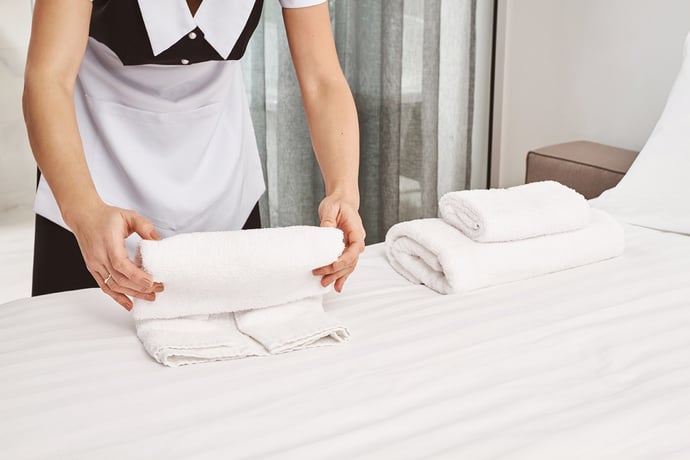
On August 27th, 2019, Allbridge presented a webinar in conjunction with TraknProtect to review new staff safety regulations going into effect across the United States. The regulations themselves vary across different jurisdictional areas and hotel brands, but the core requirement is that hotels must provide safety buttons to their in-room service employees. The buttons are to be utilized when the employee is presented with a situation where they feel unsafe.
The webinar, hosted by Allbridge Chief Product Officer, Matt Koch, and TraknProtect Chief Executive Officer, Parminder Batra, dives into who will be affected, what led to these mandates becoming so widespread, and how to ensure your hotel is in compliance. Batra explains how the regulations, which began as labor union requirements in New York and Washington D.C., quickly took off following the rise of the #MeToo movement.
Shortly thereafter, several cities made these regulations a legal requirement, with mandates coming out in New York City, Seattle, and Miami Beach. New Jersey was the first to implement a state-wide regulation, which was passed on June 11th, 2019, with Washington state and Illinois following suit. On top of that, the American Hotel & Lodging Association now has the 5-Star Promise, an initiative to ensure in-room hotel staff across the country are equipped with employee safety buttons. Several major hotel brands, including Hilton, Hyatt, IHG, Marriott, and Wyndham have committed to upholding the initiative. Batra notes that all hoteliers should be prepared to meet regulation:
"There’s twenty-four brands today that have made the commitment to that same 5-Star Promise, as well as multiple property management groups that host hotels who have also made the commitment. Every hotel, pretty much, in the US will either fall into a jurisdictional area where it's required, such as Sacramento County, Oakland, Long Beach, or they'll fall into a brand where this is required."
Batra goes on to explain that with so many jurisdictions having upcoming deadlines to meet compliance, it's in hoteliers' best interests to act now to get the devices implemented.
"New Jersey hotels have until the end of December to implement, and from a best practice perspective, I would say the earlier you can start, the better. Because as we found in Chicago, what happens at the end is everyone’s in a rush. Given Christmas and holiday seasons, inventories can be low, shipments get derailed with the Christmas traffic, and rather than face that - with any vendor that you choose - that’s something you need to take into account. So I would say the sooner the better, and that also allows you to train your employees, which is also part of the requirement."
New Jersey has one of the highest penalties in the country for non-compliance, with a $5,000 penalty for the first violation and a $10,000 penalty for each subsequent offense.
Batra gives several useful tips during the webinar for property owners to use as they implement the devices:
- Start early. Implementation plans must be set in motion soon to ensure availability of devices and allow for property installation before the end of the year.
- Review the safety procedures with your employees. Every device is different. TraknProtect, for example, must be pressed and held for three seconds. Other vendors' devices may function differently.
- Not only should employees be trained on how to use the devices, but also how to respond in a dangerous situation. Being aware of their surroundings, being assertive, and leaving unsafe situations are imperative.
- Employees should get to a safe location after pressing the button, if possible. The TraknProtect button has location tracking, so security will be able to locate the employee in possession of the activated button.
- Encourage employees to report harassment. 67% of hospitality workers who experienced sexual harassment did not report the occurrence to a manager or supervisor.
- Ensure your devices have LTE failover in case your property Wi-Fi goes out.
Watch the full recording of the webinar below:





